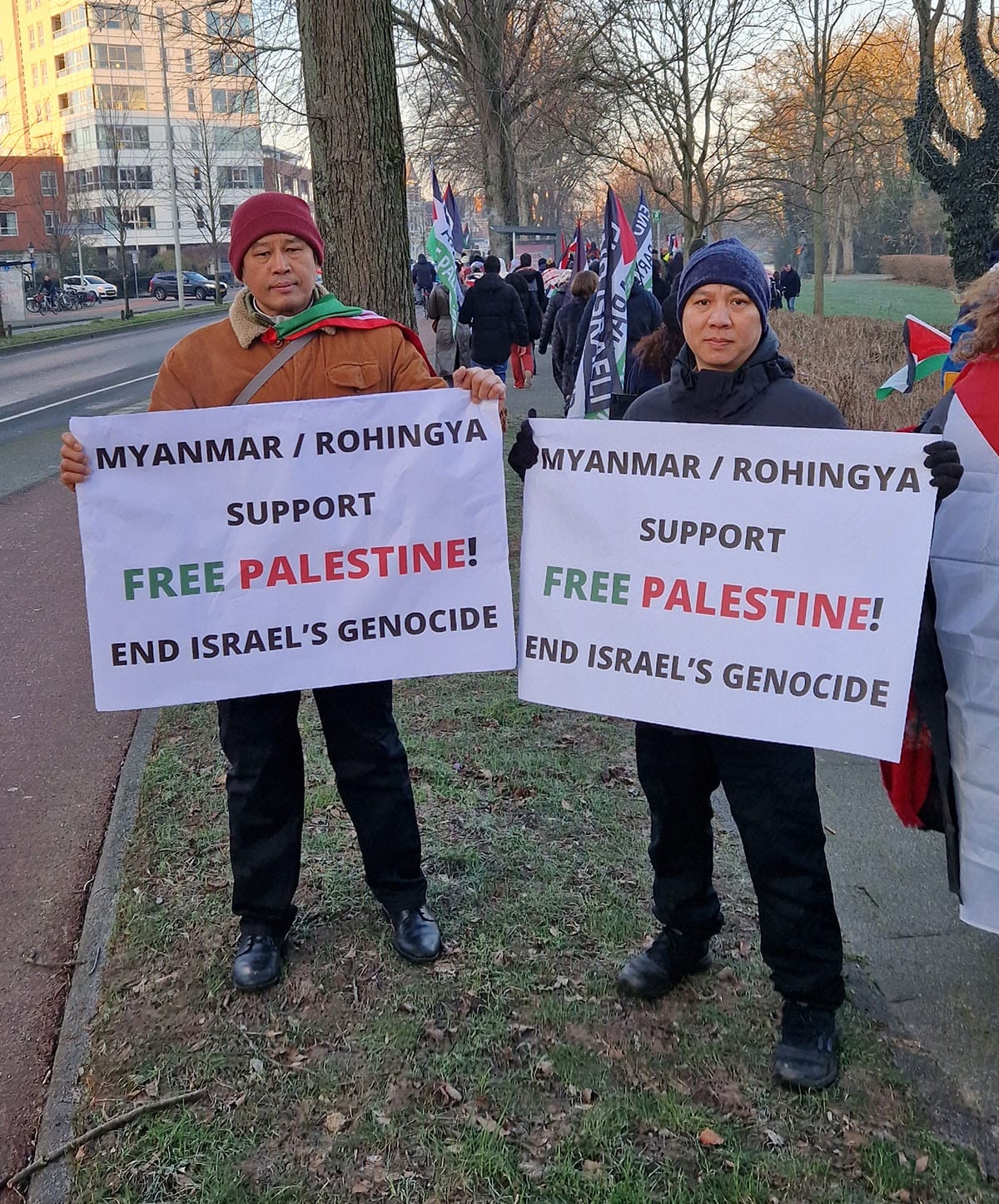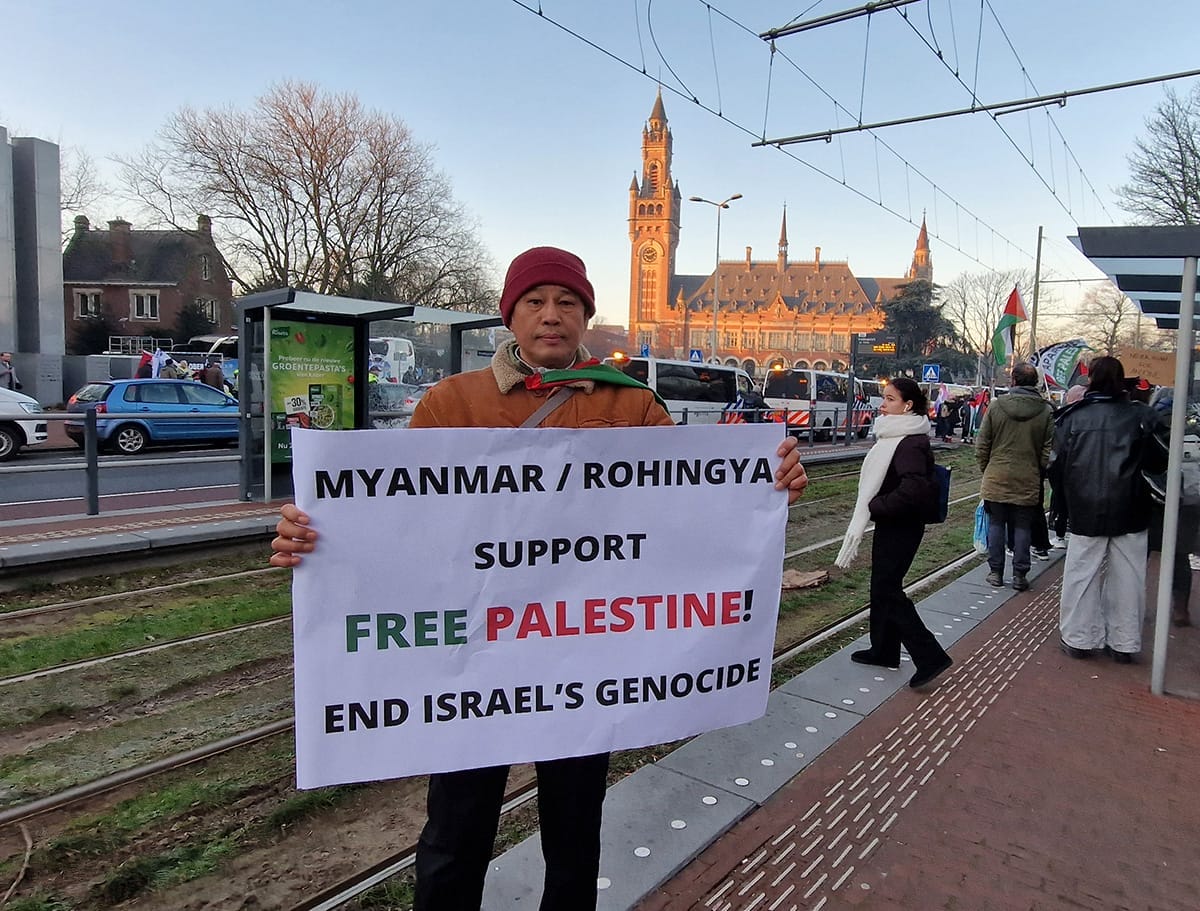Five years ago, in her 12-minutes message of solidarity to the Free Rohingya Coalition conference at Barnard College/Columbia University in New York the renowned scholar and revolutionary Angela Davis named Israel as Exhibit A of a deeply troubling real-world phenomenon wherein formerly persecuted people (and individuals, such as Aung San Suu Kyi of Myanmar, my country of birth) morphing into persecutors themselves.
[embedyt] https://www.youtube.com/watch?v=bRZoO_GAY_0[/embedyt]
The International Court of Justice (ICJ) public proceedings, The Republic of South Africa vs. Israel scheduled at the Palace of Peace on 11 and 12 January, lend credence to Professor Davis’ rather perceptive observation. Davis made her pointed comment against the backdrop of Myanmar’s state-led and society-backed genocidal destruction and mass deportation of Rohingya in different stages and waves since the late 1970’s.
This morning BBC Radio Four, the BBC correspondent Jeremy Bowen characterized Israel’s legal team, which will defend and deny S. Africa’s genocide allegations, as “very high-powered”. The Israeli team includes a Holocaust survivor from Lithuania who served as Israel’s Attorney General.
In terms of the televised optics – and legal rhetoric – inside the ICJ, what can be more powerful than a survivor of the genocide by Lithuanian Fascists during the Second World War, draped in the lawyerly black robes?
The world will witness the theatrical performance laced with legalese, but anchored in the typically emotive discourse of Holocaust survival, coupled with the evocation of Anti-Semitism.

I imagine, the 17-judges in the courtroom as well as millions of spectators, Free Palestine activists, Zionists and Palestinians, will be served the personalized legal defence line, inter alia, of “I KNOW and SURVIVED the Holocaust. These genocide allegations by S. Africa are ‘baseless’ and “meritless”, hence warranting no further pursuit by the ICJ.”
John Kirby, a key member of Joe Biden’s National Security Council has already dismissed S. Africa’s invocation of the Convention on the Prevention and Punishment of Genocide against Israel, using all derisive adjectives available in English language, as to be expected of a functionary of a genocide-enabling state that finances, arms and protects – not humans nor international norms – but the perpetrators of Israel.
On its part, Israel has come a long way – a very long way – from its founding days in 1947 and 1948 – during which the nation’s “father,” David Ben-Gurion, a pre-WWII Zionist settler from Warsaw, was known to have dismissed Jewish survivors of dozens of Nazi death and concentration camps in Nazi-occupied Europe, including those from Auschwitz, as “human debris”. That is, not the kind for the soon-to-be-established Zionist state of Israel in the land already densely inhabited by multi-faith populations of Arabs and others.
After all, the natives of Palestine were already resistant to the land grab – and mass population implant or large-scale immigration – by Europe’s unwanted refugees.
In her biography “My Life” (1975), Golda Meir, who was born in Kiev, Ukraine in 1903 described how angry she was at her own father’s inability to do anything more to protect her family than nailing timber to the main door of their poor home as Jew-hating Ukrainian killers roamed around the city with the chants and signs calling for the blood of “Christ killers”. She and her family immigrated to Wisconsin, USA when she was still in her childhood. A Socialist Zionist, Meir subsequently settled in Palestine and became the Prime Minister of Labour Party.
Ben-Gurion’s lack compassion for the survivors of Nazi genocide, notwithstanding, against this backdrop, strategically this “survivors-as-debris” thinking must have made strategic sense to him in the scheme to realize of the dream of (political) Zionism in the land that empirically – as opposed to biblically – belonged to the natives of Palestine,
During what Palestinian’s call the Nakba in 1948 (or Palestinians equivalent of the Holocaust), Ben-Gurion had reportedly ordered his armed followers to line up scores of Palestinian villagers and town residents in various places, slaughter them, and spread the news of terror. The aim was to drive fear down the spines of the non-Jewish natives of Palestine to ensure they dare not even dream of returning to their homes and villages.
Such terrorising of members of a marked population occurred throughout Europe and beyond in the first half of the 20th Century – against Eastern European Jewry, for instance – by Hitler’s Eastern Group in places like Lodz, (formerly Polish, and now Ukrainian town). Admittedly, there is a crucial difference between the Nazis’ slaughter of their victims and the early Zionist’s mass execution of Palestinians. The Nazis pursued the total physical destruction of the entire Jewry in all the occupied European territories, while Ben-Gurion’s Zionists sought mass displacement of the Palestinian residents through terror campaigns.
The ultimate objective of both was, and still is, the acquisition of land, or “living space”, for the mono-ethnic population of one’s own kin at the devastating expense of the residential population whose lives, livelihoods and communities have been uprooted and ultimately destroyed.

Protest at ICJ, January 11, 2024. Photo: Zarni
To the lay public genocide is understood as a set of coordinated acts of intentional destruction of an ethnic, racial, religious or national population or group – typically an already oppressed, excluded, discriminated, disenfranchised and demonized group – by powerful actors and dominant ethno-religious groups in society. This may involve the destruction of an entire group or a substantial segment. Genocides have popular support from the dominant society at large – or at least a substantial segment – which have been conditioned to view the marked population as “an existential threat” “a threat to national security” or “racial and religious purity”.
It is, then a horrific irony, that a legally trained Holocaust survivor will be defending the State of Israel, denying that “The One and Only Jewish State” (as Netanyahu is wont to stress) is committing genocide in Gaza. There is also a parallel but inter-connected slow and institutionalized genocide in other Occupied Territories of West Bank and East Jerusalem.
To the legally minded, the idea of a state defending itself against the invasive assault against its citizens on its soil is seductive.
A case in point.
Sir Keir Starmer, the leader of the opposition Labour Party in UK and a lawyer who formerly headed Britain’s Department of Public Prosecution, had even gone so far as to, in effect, imply, that Israel has, as a matter of self-defence, the right to cut of power, food supplies and water to 2.3 million Gazans half of whom are children.
The issue of proportionality of Israel’s “defensive” response misses its “genocidal character”. Genocides are distinct from conflicts. Victims and perpetrators cannot be placed on the same moral plain.
That is why, understanding genocides comparatively is imperative in the midst of the loud mantra of “self-defence” one hears ad nauseum in media and policy circles, particularly in the capitals of genocide-enabling Euro-American states such as Washington, London, Berlin, Ottawa, Paris, Brussels, and so on.
Self-defence has been a common justificatory narrative in virtually all genocides. Whatever the juridical proceedings inside the ICJ chamber on 12 January, Israel’s day of rebuttal, We the People worldwide need to have a historical, sociological & empirical perspective, beyond the narrow technicalities of Law.
My own predominant Buddhist society of Myanmar partook in the genocidal destruction of Rohingya in our final wave of mass slaughter, mass deportation and mass physical destruction of their villages and homes in 2017. We were conditioned through state propaganda to view Rohingyas on their own ancestral and historical land of Western Myanmar as a “national security threat”. Armed Rohingyas too were portrayed as “terrorists” and “Islamicists” and their civilians, “terror supporters”.
Further Hitler and Kaiser Wilhem II viewed German Jews as “parasites,” leeching on the racially superior German society. Accordingly, Hitler and his executioners deployed genocide as self-defence, against the race that was contaminating the Aryan society of blond-haired and blue-eyed people. In the 1990’s, Rwandan Hutus were led or misled by the propaganda that the Tutsi minority were about to kill them all, and they must pre-emptively slaughter all Tutsis. Khmer Rouge victims were all a threat to Kampuchea’s “classless revolution” and a new society being built at Year Zero.
For all its public relations value and moral uses, the Genocide Convention is an empirically and theoretically/conceptually insufficient technical document. It has created the “intent” bar (for proof) as the focal point.
Consequently, lawyers making the genocide arguments are typically forced to chase this “mental element” or intent behind physical destruction (5 genocidal acts encoded as a part of the Convention). Conceptually and intellectually, the convention is ill-equipped to deal with the most common sociological and socio-psychological theme: destruction of the enemy as an act of self-defence.
Burma (renamed Myanmar by the country’s mass-murderous military leadership in 1989 after a long series of bloodbaths of peaceful dissidents and protestors) and Israel were birthed as new post-World War II nations in the same year of 1948 – January and May, respectively. Outside Euro-America, we were the first to recognize and support the establishment of the “Land of Israel”, to borrow the term from the Israeli historian Shlomo Sand’s acclaimed monograph (Verso Paperback, 2014). Despite changes in political leadership in both nations, the political and military ties between Myanmar and Israel have remained close, collaborative and strong. Israel trains Myanmar’s military and security apparatus and sells the latter arms and surveillance equipment, amidst worldwide condemnation of Myanmar’s genocide of Rohingya and political repression against minorities and dissidents.
Moreover, while both countries carry out genocidal assaults on the targeted “enemy” or “unwanted” population – on defiant Palestinians under occupation and the Rohingya victims of the slow-burning genocide –, Israeli and Myanmar ministries of education have even signed an official Memorandum of Understanding with the specific purpose of cleansing the official histories and textbooks of the two nations of any historical facts and perspectives deemed disparaging to the nation’s self-image as good and virtuous peoples.
I can imagine Ben-Gurion turning in his grave as a piece of “human debris” from ashes of the Holocaust stands up to deny and defend the Israelis’ pogroms and the Jewish State’s all-too-apparent genocide.
Maung Zarni
Banner: Zarni protest at ICJ, January 11,2024. Photo: Zarni
More reading:
Israel to face Gaza genocide charges at World Court
By Mohammed Salem, Nidal Al-Mughrabi and Anthony Deutsch
A Crack in the 75-Year-Old Wall of Impunity: South Africa’s Court Challenge of Israeli Genocide
by Craig Mokhiber – Phyllis Bennis
Powerful states are killing international law, genocide convention
Maung Zarni (The Jakarta Post)





